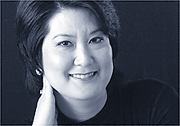Advertisement - Click to support our sponsors.


Changing Hawaii
IT'S 9:30 a.m. and the Aloha Tofu Factory on Akepo Lane is churning out its daily fare. The aroma of deep-fried tofu is as attention-grabbing as the loud machinery packaging white blocks of soy. The trouble with tofu
Customers come to the door with empty containers and walk away with steaming portions of yudofu -- unprocessed, water-filled tofu that can be mixed into soups or eaten as is with shoyu and green onions.
Delivery vans shuttle in and out of the Kalihi parking lot, servicing the biggest supermarkets, okazuya stands and hotel eateries on Oahu. It's busy today.
At least one person comforted by all the activity is 33-year-old Paul H. Uyehara, one of eight family members who toil at the company founded by Kamesaburo and Tsuruko Uyehara in 1950.
Just last November, the same work area stood quiet and empty as demand for tofu products dropped precariously by 80 percent, forcing the Uyeharas to send their employees home.
Then last week orders dipped again at the largest tofu manufacturer in Hawaii (and presumably at other makers of soy products in the islands), with two culprits to blame, according to Paul:
"Though we have had many challenges throughout the 50 years we have been in business, none may be more daunting than the current one facing the tofu industry in Hawaii," wrote Paul in a recent letter to the editor.Dr. Lon White of the Pacific Health Research Institute, who said he has found a strong link between tofu consumption and faster aging among Japanese-American men.
The two Honolulu dailies, for giving Dr. White's theory big play when announced last year and again this month, when his observations were formally published in the Journal of the American College of Nutrition.
"How do we attempt to correct the wrong we have been done by the preliminary findings of research linking tofu consumption with brain aging? Even with the researchers' own admission that this is by no means a conclusive study...we have been forced to yet again watch our business suffer.
"Can this kind of reporting be considered justified? Who will compensate us for our loss of revenues and reputations? When the researchers say, 'Sorry, we were wrong,' who shall we turn to for redemption?"
DESPITE the trauma to bottom line and family pride, Paul acknowledges silver linings to the controversial study and its impact on business.
The threat has managed to unite the industry statewide, with its 12 members about to launch a joint marketing effort in grocery stores with tear-off recipe cards and mini posters lauding the healthy benefits of tofu.
Loyal customers, especially walk-ins who want soy products fresh from the factory, have been quick to offer sympathy, advice and support to the Uyeharas -- Paul, Roy, Sada, Yuri, Nancy, Marcy, Kurt and Kean.
And then there are the unsolicited testimonials, including one cute letter from a fourth-grader at Kapunahala Elementary: "My science project for this year was about tofu. My family and I eat tofu all the time and I believe it is very good for you. I decided to do a project with two mice and fed one of them tofu to see which would be smarter.
"The result was that the mouse that ate the tofu was faster, slimmer and more intelligent than the one that ate the mouse food. In conclusion, I believe that tofu affects intelligence in a positive way. Sincerely, Michele."
Now THAT'S what Paul considers scientific research. Take that, Dr. White!
Diane Yukihiro Chang's column runs Monday and Friday.
She can be reached by phone at 525-8607, via e-mail at
dchang@starbulletin.com, or by fax at 523-7863.